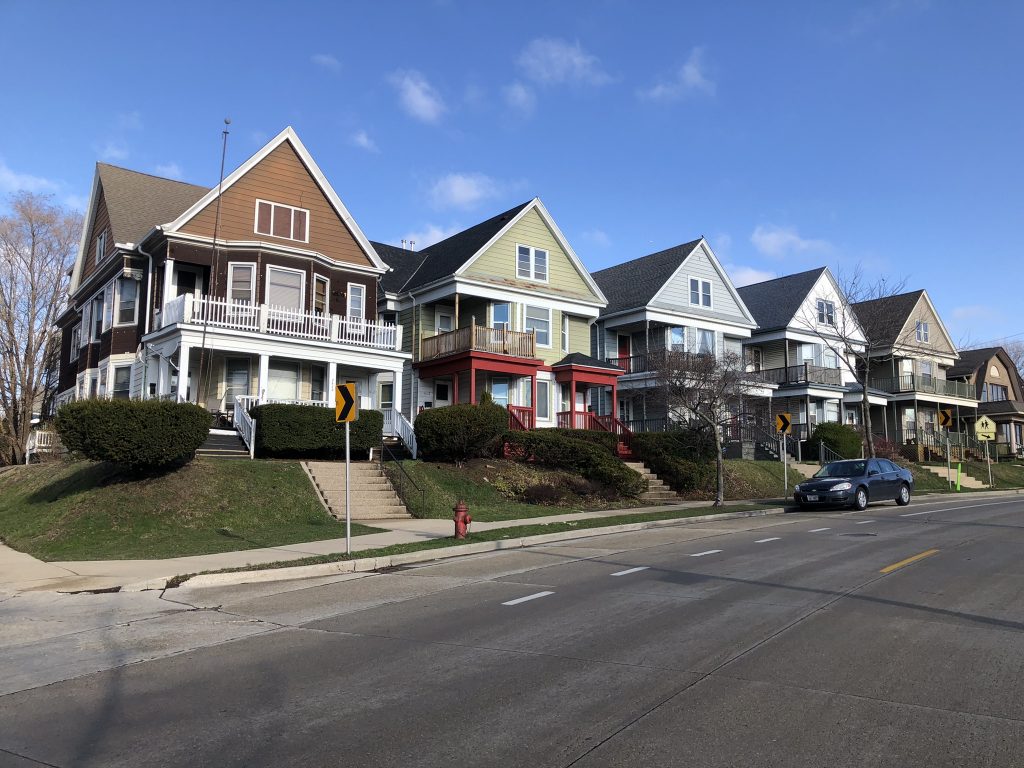Proposal Would Incentivize Landlords To Accept Assistance Vouchers
Proposal seeks to address housing voucher discrimination by adding incentives for landlords.

Houses on S. Howell Ave. in Bay View. Photo by Jeramey Jannene.
The Milwaukee County Board will consider legislation in March that county officials have said could help address housing voucher discrimination.
Renters using federal Section 8 housing vouchers, which guarantees recipients will not have to spend more than 30-40% of their income on rent, at times find that landlords won’t rent with them. Housing advocates and officials refer to the problem as housing voucher discrimination.
In 2018, the Milwaukee County Board passed a county ordinance sponsored by then-Sup. Marina Dimitrijevic outlawing rental assistance discrimination. The legislation sketched out a system for enforcing the ban that has failed to protect a single renter in Milwaukee County. The county’s attorney says state statutes and existing case law indicate it likely does not have the legal authority to enforce its own ordinance, as Urban Milwaukee reported.
In January, the Housing Division outlined alternative strategies for addressing the problem of housing voucher discrimination. Sup. Shawn Rolland is running with one of the ideas and has sponsored legislation that would create a program to incentivize landlords to accept tenants relying on rental assistance.
“It is hard for me to think of another one county policy that failed so comprehensively as [the 2018 ordinance], that failed people in need so completely as this one did,” Rolland told Urban Milwaukee. “We did not help even one person escape housing discrimination, not one.”
Rolland proposes the county create a fund that would allow the Housing Division to cover the cost of repairs in Section 8 rental units when the tenant cannot afford to pay. Rolland’s resolution allocates approximately $356,000 to the project, which the Housing Division reported would allow it to guarantee damage mitigation, and to also offer signing bonuses and unit holding fee agreements, which allow the county to maintain a pool of private housing that can be passed from one rental assistance tenant to another.
“There is zero evidence anywhere to suggest that people who receive rent assistance from Milwaukee County don’t pay their rent or don’t cover the cost of damage more than any other run-of-the-mill person,” Rolland said. “But sometimes perception is reality, and at the end of the day we need more landlords to raise their hands and join us as partners.”
He hopes an incentive program “finally tips the scales of perception in these tenants favor.”
Discriminating against housing voucher recipients is essentially class-based discrimination, but in Milwaukee this problem predominantly affects people of color, Rolland said.
Mitigating concerns about tenant damage was one of the strategies presented by the Housing Division, which reported that it is one of the primary concerns landlords express about renting to Section 8 tenants. It also comes right out of the U.S. Department of Housing and Urban Development (HUD) playbook for making Section 8 renters more competitive in the rental market.
The Housing Division maintains a list of landlords that accept tenants with vouchers, Rolland said, so the county will know very quickly whether the incentives work or not.
“And we can see if we have been successful, and you know, if it fails, then we fail fast, and we can try something else,” he said.
Changes to State Law?
Another resolution sponsored by Rolland would have the county ask the state Attorney General for a formal opinion on the county’s legal authority to enforce a ban on housing voucher discrimination. The resolution also asks the county’s lobbyists to request changes to state law from the legislature and the governor that would clear up the ambiguity surrounding the county’s enforcement authority.
If the county does find itself with clear-cut authority to enforce its ordinance, it will likely run into another problem: no enforcement apparatus. The county currently has no resources committed to investigating or bringing civil actions against landlords for voucher discrimination.
Securing a change in state law and standing up an enforcement apparatus are unlikely to occur quickly. But in the past, Rolland received pushback from some of his colleagues on the board for suggesting incentives.
“I am on the side of whatever solves the problem, okay,” he said. “So I’m very open to any penalties or any incentives that can meaningfully move the needle in this.”
Read the full resolutions proposing housing voucher incentives and requesting changes in state law on Urban Milwaukee.
If you think stories like this are important, become a member of Urban Milwaukee and help support real, independent journalism. Plus you get some cool added benefits.
Political Contributions Tracker
Displaying political contributions between people mentioned in this story. Learn more.
MKE County
-
Fellow Judge Testifies in Dugan Case
 Dec 16th, 2025 by Graham Kilmer
Dec 16th, 2025 by Graham Kilmer
-
Key Questions in Dugan Trial Take Shape on First Day
 Dec 15th, 2025 by Graham Kilmer
Dec 15th, 2025 by Graham Kilmer
-
FTA Tells Milwaukee to Crack Down on Fare Evasion — Even Where Fares Don’t Exist
 Dec 12th, 2025 by Graham Kilmer
Dec 12th, 2025 by Graham Kilmer





















when did a word like ‘incentivize come into our vocabulary???? americans really don”t like talking or acknowledging class differences. i agree with rolland about discrimination with vouchers being about class too.
“Housing Voucher Discrimination” sounds somewhat one sided. Has anyone asked small “mom & pop” landlords why we don’t like to accept Section 8 (City or County) vouchers? From my perspective as a landlord who used to accept them, the application process was arduous, and the minimal improvements required on properties were short term and sometimes costly, and changed at the whim of an inspector. It just wasn’t worth the hassle!
And of course, Section 8 renters usually have lots of children with single parents who had to work at minimum pay jobs, and wouldn’t provide the necessary parental supervision to prevent their kids from damaging the property that they never paid for. I had to replace at my expense broken windows, holes in walls, doors pulled off hinges, broken plumbing. No accountability or responsibility or parental guidance.
And I went through the usual prerental application processes and security checks. Also, Social Development Commission (SDC) was not the easiest agency for landlords to work with, slow on returning calls or implementing actionable things.
Anyone else have these issues?
I’d love to see more rent to own programs that included teaching people about financial responsibility, how to save money and ultimately family wealth. Section 8 should have these goals for their clients.
There are multiple, deep roots to this issue. Discrimination; Poverty; Segregation; Mass Incarceration are Structural & Institutional manifestations suffered by the working poor today. It should be no surprise these disproportionally impact Black Citizens.
Wisconsin’s “Living Wage” for one person is $20.22 yet, our
Minimum Wage is $7.25 (described as Poverty Wage).
That’s why adults must work more than 1 job.
It’s unconscionable in the wealthiest country in the world!
Former President Regan fired striking Air Traffic Controllers on 1982. That was “the death knell” of the Unions. Former living wage Jobs were moved south without union protection. Many regulations were reversed.
Reganomics encouraged greed. Meanwhile, the Regan/Bush Administrations policy toward cities in the urban north was “benign neglect”.
HUD created “red lining” in the 1930s: it caused segregation.
Black WWII Veterans were denied GI Bill Home Loans. The very opportunity to build stability, equity & generational wealth.
My father, uncles & all White Veterans benefited from home ownership.
Milwaukee remains the most segregated city & the worst place to raise children in the U.S.
400 years of Slavery caused 26 generations of Black trauma. Conversely, White plantation owners & bankers profits were extreme
Post Civil War Reformation was short lived. It led to “convict leasing” wherein Black were accused of anything to serve Whites. These factors created fear of law enforcement.
This explains the origin of Mass Incarceration. Wisconsin has the the highest rate of Incarceration in the USA. Locking up Citizen’s damages the Community & Children are left fatherless.
Furthermore, USA incarnates more people than any country.
I’m curious if you have any insight as to the reason there is no “great migration” out of Milwaukee/ Wisconsin if the conditions are so detrimental?
I’m not asking to be snide or cynical , I’m curious if in your study of the issues, that you also have data (not opinions) that answer the question why populations that are on the losing end of all the studies don’t relocate to any other city/state where they will find a better opportunity, or at least a fair shake.
I think it’s an important part of the discussion that gets omitted when citing the hard data from all those studies… ie: why does any person
choose to live in this city/state if it is the worst place in America for them to live?
Just some overall population numbers for the city of Milwaukee:
1960 – 740,000 – 11th largest city in the U.S.
2022 – 569,000 – 31st largest city in the U.S.
https://www.biggestuscities.com/city/milwaukee-wisconsin
During this time period the U.S. population has grown from 180MM in 1960 to 335MM today.
While the U.S. population has grown 86% in the last 60 years, Milwaukee has declined 23%.
Without the explosive population growth in the “greater downtown area” the last 25 years, these numbers would be much worse.